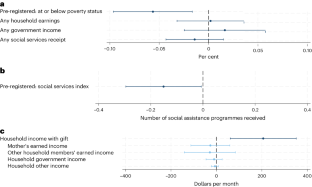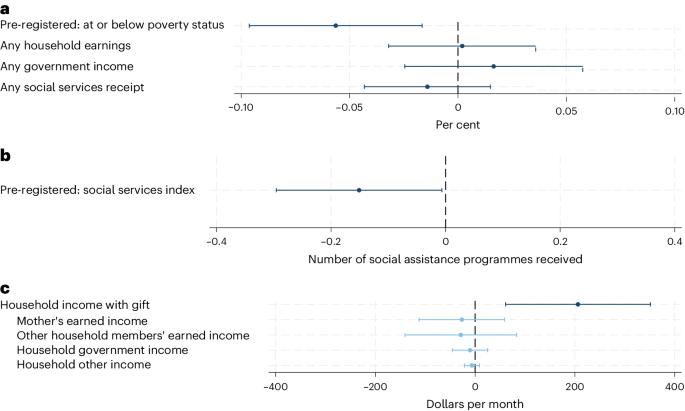美国低收入家庭从出生起每月无条件现金转移对家庭投资的影响
IF 21.4
1区 心理学
Q1 MULTIDISCIPLINARY SCIENCES
引用次数: 0
摘要
贫困家庭的无条件收入如何影响父母对幼儿的投资?美国四个大都会地区的母亲被随机分配到每月无条件的现金转移中,即在分娩后的最初几年里,每月领取 333 美元(高额)或 20 美元(低额)。在最初的 3 年中,高额现金赠予家庭比低额现金赠予家庭在儿童专用商品上花费了更多的钱,在儿童专用早期学习活动上花费了更多的时间。其他家庭核心支出几乎没有明显变化。与低现金馈赠家庭相比,高现金馈赠家庭的公共福利领取率较低,贫困家庭的数量也较少,但到第 3 年时,大多数家庭的平均收入和财富仍然较低。在母亲参与有偿工作、儿童保育时间或母亲的主观幸福感方面,没有明显的统计学差异。本文章由计算机程序翻译,如有差异,请以英文原文为准。


Effects of a monthly unconditional cash transfer starting at birth on family investments among US families with low income
How does unconditional income for families in poverty affect parental investments for their young children? Mothers in four US metropolitan areas were randomized to receive a monthly unconditional cash transfer of either $333 per month (high) or $20 per month (low) for the first several years after childbirth. During the first 3 years, high-cash gift households spent more money on child-specific goods and more time on child-specific early learning activities than the low-cash gift group. Few changes were evident in other core household expenditures. Compared with low-cash gift families, high-cash gift families reported lower rates of public benefit receipt and fewer were residing in poverty, although mean income and wealth remain low for the majority of families by year 3. No statistically significant differences were evident in mothers’ participation in paid work, children’s time in childcare or mothers’ subjective wellbeing. In this randomized controlled trial, Gennetian et al. evaluated the impacts of cash transfers on family investments. Families with low income were randomized to receive monthly unconditional cash starting at childbirth. Households spent more money and time on child-specific goods and learning activities.
求助全文
通过发布文献求助,成功后即可免费获取论文全文。
去求助
来源期刊

Nature Human Behaviour
Psychology-Social Psychology
CiteScore
36.80
自引率
1.00%
发文量
227
期刊介绍:
Nature Human Behaviour is a journal that focuses on publishing research of outstanding significance into any aspect of human behavior.The research can cover various areas such as psychological, biological, and social bases of human behavior.It also includes the study of origins, development, and disorders related to human behavior.The primary aim of the journal is to increase the visibility of research in the field and enhance its societal reach and impact.
 求助内容:
求助内容: 应助结果提醒方式:
应助结果提醒方式:


